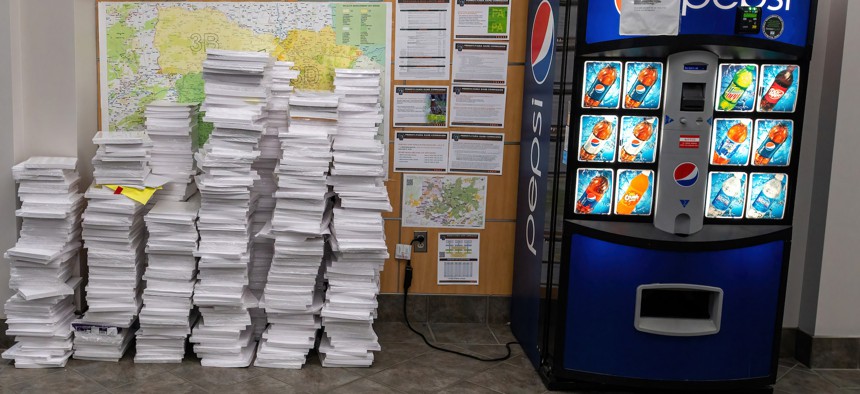This Pennsylvania County Ran Out of Ballot Paper on Election Day. Now the District Attorney is Investigating

Stacks of ballot paper were delivered to the foyer of the bureau of elections in Luzerne County. Mid-day on Election Day, polling places in Luzerne County started running out of ballot papers. Aimee Dilger/SOPA Images/LightRocket via Getty Images
One week later, angry voters demand to know why Luzerne County polling places had ballot shortages.
This article was originally published by Votebeat, a nonprofit news organization covering local election administration and voting access.
An Election Day paper shortage in one Pennsylvania county that led poll workers to turn away some voters is now under investigation.
The Luzerne County Board of Elections and Registration asked the district attorney Monday to look into why dozens of precincts ran out of ballot paper. The shortage led to voting delays at the affected polling places, voters being turned away, and an emergency court order to keep polls open until 10 p.m. — two hours after they usually close — to give voters who were previously denied access to the ballot a second chance.
One week later, the cause of the shortage is still unclear. At a meeting of the Board of Elections Monday night, board members offered no new details despite pleas from dozens of residents during a public comment period that lasted well over an hour.
“As a first-time judge of elections, I was appalled, disheartened, and embarrassed on Election Day,” said a woman who identified herself as the judge of elections at a precinct that ran out of paper. “Tell me how we ran out of paper for the polls? Someone definitely failed to do their job.”
Acting Director of Elections Beth Gilbert McBride was not present at the meeting, nor were any staff from the elections office, who normally attend. Gilbert McBride was put in charge of the election in August, shortly after the resignation of the previous director, Michael Susek, and one month after the county had hired her as deputy director.
The board voted unanimously to refer the matter to District Attorney Sam Sanguedolce for investigation. Denise Williams, chair of the Luzerne County Board of Elections, said despite some calls to have the county controller handle the investigation, the Pennsylvania election code stated it should be handled by the district attorney and that this was the procedure the board had used in the past.
Sanguedolce said Tuesday morning that the investigation would be conducted by his Election Integrity Task Force, but he did not offer details on how the investigation would be conducted or a timeframe for its completion.
“While I understand [concerns of timing], it is naturally more important to get it right than to get it done quickly,” Sanguedolce said in response to questions from Votebeat and Spotlight PA. “We will exercise all due diligence to get answers as quickly as possible.”
Williams said Monday that once the elections office had finished its work related to the Nov. 8 election, it would also conduct an internal investigation.
The office was still tallying provisional votes as of Monday night.
Gilbert McBride, the acting elections director, and Acting Deputy Director of Elections Emily Cook did not respond to emails from Votebeat and Spotlight PA seeking explanations about the paper shortage and plans for the internal investigation. Williams said the office was not in attendance due to their continued work on the election.
With the exception of Luzerne, Pennsylvania’s 2022 midterm election proceeded without major problems, even as counties worked to meet a new requirement that they count all mail ballots beginning the morning of Election Day without stopping.
Some residents and board members at Monday’s meeting in Luzerne, a county of more than 300,000 people near Scranton in the northeast part of the state, called for the acting elections director, and the election board members, to resign.
“I find it absolutely appalling and disgusting that we are unable to actually investigate this because the people responsible … because people just decided not to come to the meeting,” Alyssa Fusaro, a Republican board member, said. “This is a problem. We need to investigate this fully and clearly. The people want answers.”
Voters described being told at their precinct to come back later, and several election workers themselves described sending voters away, with some never to return.
“We turned away, as an accurate estimate, some 50 voters when we had no operating machines and no printer paper and no paper ballots,” said Brian Dwyer, a Larksville Borough constable who was at the polls. “Our best estimate is only 20 of the citizens came back to vote.”
Other poll workers recounted stories of turning voters away, and on Election Day, County Council member Brian Thornton told the Times Leader he estimated the number could be in the hundreds or thousands.
Many residents questioned whether their vote would be properly counted, since they voted on regular printer paper or filled out provisional ballots. Provisional ballots are counted as valid votes, so long as the voter did not previously cast a ballot by mail or in person.
While most counties in Pennsylvania use a system where voters hand mark paper ballots which are then fed into ballot tabulation machines, voters in some counties, like Luzerne, make their selections on machines called ballot-marking devices. Those selections are printed onto paper ballots, which voters then feed into tabulation machines, explained Forrest Lehman, longtime elections director in Lycoming County and an expert in elections administration.
“That’s a configuration where voters are, so to speak, printing a ballot on demand,” he said, “but you still have to have paper for all of the ballots.”
Chalkbeat is a nonprofit news site covering educational change in public schools.
Carter Walker is a reporter for Votebeat in partnership with Spotlight PA. Contact Carter at cwalker@votebeat.org.
NEXT STORY: Twitter Turbulence Under Elon Musk Poses Headache For Governments





